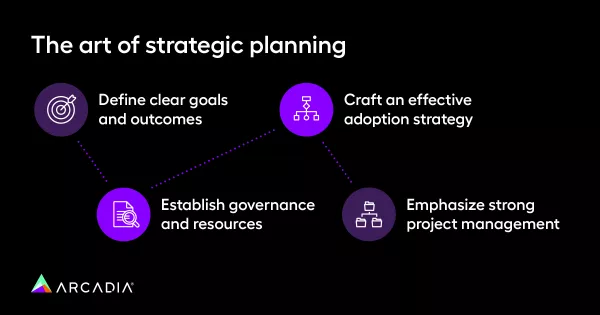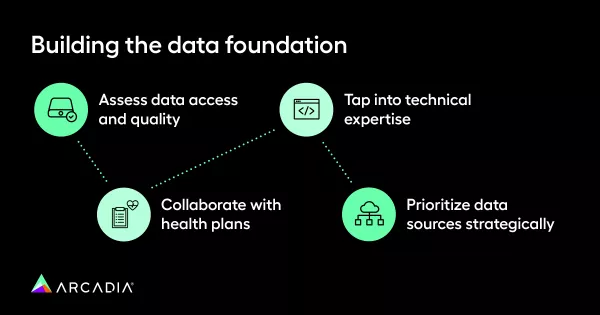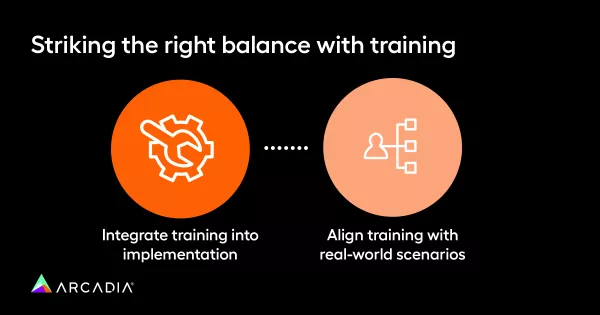How to accelerate your platform implementation
Unlocking success in healthcare transformation through strategic planning, data integration, and training
Technology plays an increasingly pivotal role in improving patient care, streamlining operations, and driving data-driven decision-making. As healthcare providers consider the integration of data platforms like Arcadia's cloud-based healthcare data solution, it's essential to approach the implementation process strategically and comprehensively.
This guide will take you through an in-depth journey on how to accelerate your platform implementation successfully, catering specifically to healthcare leaders seeking insights and guidance. We addressed this topic in a Byte-Sized Booth Talk at HIMSS, which features VP of Implementation and Customer Success, Kacey Carroll.
The art of strategic planning
Any significant organizational change demands careful planning and alignment of objectives. When it comes to implementing a data platform, the strategic planning phase is critical. It involves aligning the organization's mission, resources, and goals with the implementation process. Here's a comprehensive breakdown:

1. Define clear goals and outcomes
Begin by asking fundamental questions: Why are you investing in an analytics platform? What specific goals do you aim to achieve? These could range from improving patient outcomes and reducing costs to enhancing operational efficiency and complying with regulatory requirements. Defining clear and measurable goals is the first step toward ensuring a successful implementation.
2. Establish governance and resources
Governance and resources are pivotal to ensuring a smooth implementation process. Identify clinical and operational champions who are passionate about the platform's success. These individuals will not only act as advocates for the implementation but also facilitate communication and collaboration across different departments. Physician engagement is particularly crucial, as their support can significantly influence the adoption and success of the platform.
3. Craft an effective adoption strategy
The adoption strategy sets the stage for how the platform will be embraced across the organization. Consider factors such as the readiness of your staff for change, the complexity of the platform, and the availability of resources. Depending on these factors, you might choose to adopt a phased approach, starting with a core group of users before expanding to a wider audience. Ensure that the strategy aligns with your organization's culture and values.
4. Emphasize strong project management
Implementing a data platform is a multifaceted endeavor involving numerous tasks, timelines, and stakeholders. An experienced project manager should be appointed to oversee the implementation process. The project manager will play a crucial role in coordinating efforts, tracking progress, and ensuring that everyone is working toward a common goal. Regular check-ins and assessments are essential to stay on track and address any challenges that arise.
Building the data foundation
A robust data foundation is at the heart of every successful implementation. Here's how to navigate the intricate process of data integration:

1. Assess data access and quality
Before diving into data integration, you need a comprehensive understanding of your organization's data landscape. Identify all the electronic health record (EHR) systems in use within your organization and assess their coverage of your patient population. It's essential to conduct a thorough data quality assessment to identify any gaps or inconsistencies. Collaborate closely with health plans to ensure the data you receive is accurate and up to date.
2. Collaborate with health plans
Your relationship with health plans is crucial for obtaining accurate and timely data. Regular communication with health plans is necessary to ensure that your data needs are met. Address any issues or gaps in data quality promptly to prevent hurdles during integration. This collaboration lays the foundation for a seamless integration process.
3. Tap into technical expertise
Integrating data from various sources requires technical expertise. Evaluate whether your organization possesses the necessary skills to extract and integrate the required data in-house. If not, consider outsourcing this aspect to experts who can ensure a smooth and efficient integration process. Additionally, having individuals who understand the intricacies of your data is essential for maintaining accuracy and reliability.
4. Prioritize data sources strategically
Not all data sources are of equal importance. Prioritize data sources based on your organization's strategic goals and objectives. Consider whether clinical data, claims data, or a combination of both is more relevant to achieving your desired outcomes. Align your decisions with your success criteria to ensure that the data you integrate provides maximum value to your organization.
Striking the right balance with training
Training is a critical component of any implementation process, ensuring that end-users are proficient in using the platform effectively. Here's how to approach training:

1. Integrate training into implementation
At Arcadia, we've found that training is most effective when conducted on your integrated data. Waiting until the data is live allows for more contextually relevant and practical training. Consider structuring training in workgroups to address specific functionality needs and provide hands-on experience.
2. Align training with real-world scenarios
Training should mirror real-world scenarios to provide practical insights into how the platform can be leveraged for improved workflows and outcomes. Rather than relying solely on theoretical knowledge, emphasize training that addresses the challenges and opportunities specific to your organization.
Transforming healthcare through strategic implementation
The integration of a data platform has the potential to transform healthcare organizations, leading to enhanced patient care, operational efficiency, and data-driven decision-making. By adopting a comprehensive approach that includes strategic planning, robust data integration, and effective training, healthcare providers can accelerate their platform implementation and achieve meaningful results.
In collaboration with Arcadia, your organization can navigate the complexities of platform implementation with confidence. Our expertise and technology are designed to support your journey toward data-driven excellence in healthcare.
Remember, successful implementation involves aligning strategic planning, robust data integration, and training that resonates with real-world scenarios. By following these steps, healthcare leaders can pave the way for a future where data powers positive change across the healthcare landscape.
